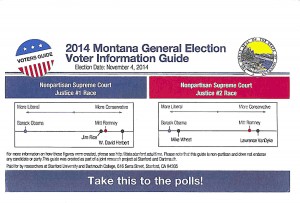A recent study conducted in Montana by Assistant Professor of Government Kyle Dropp at Dartmouth, Professor of Political Science Jonathan Rodden at Stanford, and Assistant Professor of Political Science Adam Bonica at Stanford has resulted in uproar just a few weeks prior to the state’s general Supreme Court elections.
The study was a political science experiment that involved a widespread mailing to thousands of voters across Montana, and the mailing in question was a “Voter Information Guide” that prominently featured the seal of the state of Montana. This guide featured purportedly nonpartisan justice candidates represented on a sliding scale of “more liberal” and “more conservative,” with Barack Obama and Mitt Romney used as reference points. Only upon closer examination of the fine print would recipients discover that the guide was “created… and paid for by researchers at Stanford University and Dartmouth College.”
The mailings quickly resulted in complaints from many voters across the state (including Montana Secretary of State Linda McCulloch). The complaints particularly take issue with the use of the state’s seal, which is used to denote official state materials and could easily lead to voters confusing these third-party mailings with official state materials. Complaints also cite “voter manipulation,” as the diagrams associate the supreme court candidates with political ideologies and prominent political figures (while lacking formal endorsement). The mailing also provides no straightforward information as to how these diagrams were constructed, but instead directs recipients to a section of Stanford’s website, which in turn cites several other journals and sites. Districts in California and New Hampshire were also involved in the study, though no comparable complaints have originated in either state.
Dropp, who is teaching classes on American politics and quantitative political analysis, has not made any public comment. Unfortunately, Dropp has played a role in a study which, first and foremost, is an irresponsible and ethically questionable. Though its intention is genuine in its desire to understand the “impact of information about candidate positioning on turnout and ballot roll-off in primaries, elections, and contests where voters are unable to distinguish between candidates on the basis of partisan affiliation,” the “non-partisan” study directly portrays the candidates as possessing partisan affiliations while also deceptively portraying itself as an official state mailing. An official investigation is now underway in Montana, with civil action a potential outcome.


Be the first to comment on "Study by Dartmouth Professor Draws State Investigation"